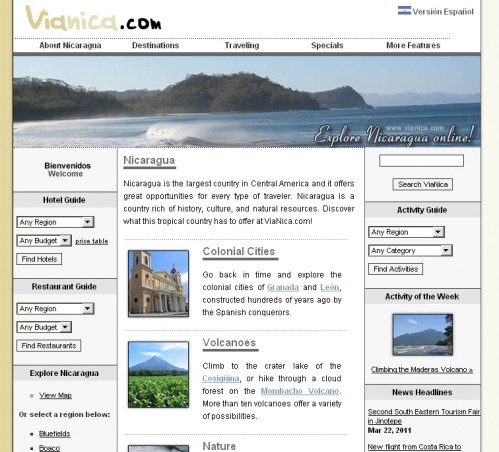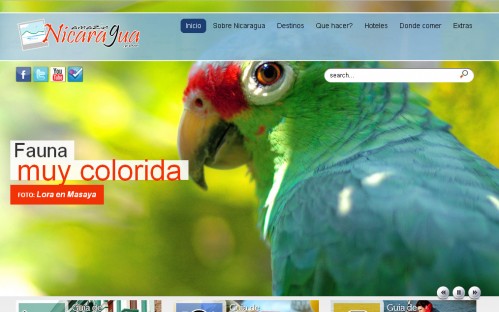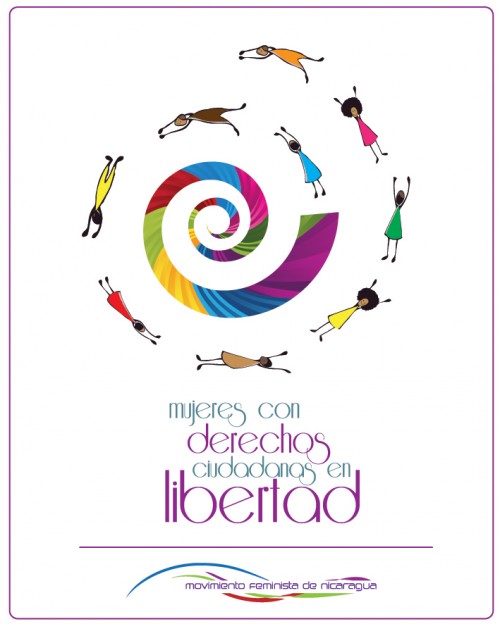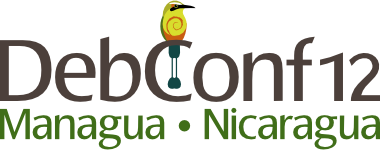The web in Nicaragua is increasingly active, with projects for social events or small businesses finding niche markets to serve online. In order to learn a little more about these practices, with the support of the Technology Support Fund [es], I created five videos or episodes for video on the web, touching on the topics of tourism and the web, the social integration of migrants and people with limited resources, gender and sexual diversity and initiatives from the free software community in Nicaragua.
These videos cover the cases of Vianica.com, Amazing Nicaragua, La Carpio online, the blogs of Grupo Safo, IDSDH, The Transgender Association, Space for Sexual Diversity, The Feminist Movement of Nicaragua, The Homosexual Community of Nicaragua, the projects Ubuntu Tablets, POSOL, and the events carried out by the Free Software Community in Nicaragua. (All links are in Spanish, except Vianica.com [en].)
The Vianica and Amazing Nicaragua videos show the feasibility of setting up sustainable businesses which can offer services in response to a higher demand for online content, be it from foreigners visiting Nicaragua or from the web-using Nicaraguan population itself.
The case of La Carpio online is relevant because it is the quintessential bi-national Costa Rican-Nicaraguan community and shows how the web can be used to serve as the face of a community which is normally excluded from the mainstream media agenda.
The Sexual Diversity and Free Software groups use facts to show, in different ways, how they organise themselves and work to achieve their aims, molding citizens who are aware that the fight for their rights may take them to hold social, legal, political or economic positions in their social environment.
Vianica.com

Vianica.com started in 2005 with a start-up capital of 1,000 US dollars and is dedicated to offering services to the large number of visitors to Nicaragua who come from abroad.
The site was set up to promote the idea of offering services for tourists and has become a pioneer in showing that a web page can form the basis of a sustainable business in Nicaragua. Vianica.com offers a nationwide hotel reservation service, advice for travellers, events and restaurant listing, services and news, all in English and in Spanish.
Vianica.com advises others thinking of doing same thing to follow clear objectives and dedicate as much time as possible to it.
Amazing Nicaragua

Amazing Nicaragua was set up with the aim of providing a web-based service for the large numbers of people coming to Nicaragua, thanks to its proximity to the United States and the Caribbean.
The site gathers together publicity regarding Nicaragua into one place, including photographs, images from google maps and comments from the users themselves.
Amazing Nicaragua is available on amazingnicaragua.com, twitter, facebook, youtube and foursquare.
Amazing Nicaragua has integrated itself into the Nicaraguan Twitter community, taking part in events such as the recent Twestival [es], held on March 24. The Twestival was a global initiative to mobilise Twitter users to support local causes through fund raising and and social awareness activities.
La Carpio online
This project based in Costa Rica works with the community of La Carpio, the biggest bi-national community of Costa Ricans and Nicaraguans. In this report we see how the site visits the area and turns it into a webspace which is representative of the voices of the community. You can learn more about this community on the webpage La Carpio Online [es], with statistics [es], galleries and information resources about La Carpio.
La Carpio Online is set in the area of the same name, in the town of San Jose in Costa Rica, born of a project by the University of Costa Rica which was aimed at bringing the local population to the attention of society in general.
Thanks to the project the area went from being known as a poor area full of immigrants, to a community of people with their own stories to tell.
La Carpio online has been created as if it were the community itself, with different ‘stops’ which allow the user to journey through the area and learn about its history. People can tell their stories about about the discrimination they have suffered and their struggle to build houses and maintain basic services.
The site can be found at www.lacarpioenlinea.ucr.ac.cr [es]
Gender and Sexual Diversity in the Nicaraguan blogosphere
There are numerous blogs written by NGOs and civil society groups tackling the subject of human rights for sexual diversity from different focuses. Whilst Grupo Safo focuses on the lesbian identity, the Transgender Association supports another focus; wide-ranging organisations such as the Feminist Movement include groups, of different tendencies, from all over the country. (All links in Spanish.)
Recent media debates regarding same sex-marriages have revealed opposing opinions on the subject.
This is a collection of blogs which are promoting opinions about sexual diversity:The Homosexual Community of Nicaragua:
A site encouraging debates on topics as varied as as sexual diversity – at both the national and international levels, to how sexual diversity should be represented at carnivals and fiestas.The Transgender Association:
Published for last time in August 2010, this site contains a lot of information regarding the transgender community's reaction to the debate about sexual diversity and same-sex marriages and society in general.The Space for Sexual Diversity:
This site was founded in 2007 and looks at the subject of relationships between men from a point of view which society in general does not see.The Feminist Movement of Nicaragua:
This is an organisation with enough economic power to fund media publicity, encouraging public debate. It is able to bring together a number of different groups at a national level who can then work together on campaigns with shared goals.ISDH: Initiatives from Sexual Diversity for Human Rights
A politically-oriented site fighting against the law making homosexuality illegal and informing people about forthcoming demonstrations and marches on subjects such as HIV and AIDS and campaigning against homophobia.Grupo SAFO:
This website promotes the image of lesbian women. The site brings together a collection of documents and articles about the work they do.
These groups are militant, active, organised, with country-wide structures and political aims.

Projects by the Free Software Community in Nicaragua
One of the groups which makes most intensive use of the web and new technologies is the free software community in Nicaragua. Due to the technological nature of its initiatives, this group is always using new methods of communication, such as social networks – like Twitter, Identi.ca, Facebook – the production of multimedia for radio or for video [es], mass conferences in universities and events organised at a regional level but with international recognition.
They coordinate activities and training through the Linux Tour [es] portal and thanks to a Wiki-format website, which allows users to correct, edit and add information in an open and collective way.
Ubuntu Tablets is a series of 3 minutes tutorials on how to use Ubuntu and related applications and is free for Linux users. The Community for Free Software has organised a number of successful events, including festivals and conferences. In 2012 Nicaragua will host DebConf12 – one of the most important conferences on Linux software in the world.
The study “Free Software in Nicaragua: an expression of collective action?” covers topics such as protecting author's rights and patents.
The study “Free Software in Nicaragua: an expression of collective action?” [es] by Rodrigo Rodríguez sums up many of the social characteristics of this group and is a point of reference on this topic.
We offer our congratulations to the current organisers of Debconf12 — a conference for developers — for making Nicaragua the venue of such an important event.

These videos and reports were made with with the support of the Technology Support Fund [es], headed by the Violeta Barrios de Chamorro Foundation [es].







1 comment
It is possible to make a living online. We started the Nica Gazette a few months ago and through advertising, both local and Pay Per Click we are making some money.